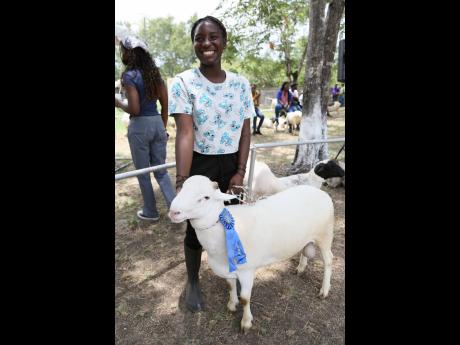Rearing sheep proves to be a winner for Akelah
15-y-o farmer excels as local demand for sheep increases
FIFTEEN-YEAR-OLD Akelah Clarke is one jubilant farmer as she showed off the medals she collected – two first places, a second and third for her prized sheep in various categories.
Caring for sheep is something that comes naturally to her, as she has been around them from a toddler.
Her father, Ryan Clarke, who was beaming with pride, said he is not surprised at her affinity with the animals, as he used to raise sheep when she was smaller and it was from there that she developed the love for them. She is also a loves goats. In fact, her father said she loves animals on a whole.
When she expressed the desire to start rearing her own, he said he bought her a few, with her uncle gifting her one as well.
The Denbigh experience is not new for her either, as Ryan said he has been taking her there every year, with the exception of the last two years due to the COVID-19 pandemic.
“So, you can say she grew with it,” her dad quipped.
For Akelah, there is nothing like caring for her flock, although there are times when her school routine prevents her.
“Being a student, I have to focus on my schoolwork. I can’t always do it, so sometimes daddy will help me with it,” she shared.
Raising her livestock doesn’t come without its challenges, as Ryan said sourcing feed can be expensive.
“I have to go and cut hay, pay people to carry it. I go as far as to Spanish Town, Mandeville, all around to buy it,” he said, adding that when the Denbigh showground was overgrown with grass, he would make use of it as source of feed for the animals.
Akelah, who has no plans to give up on her sheep rearing, said she hopes to become a veterinarian. And already, her father is doing all he can to ensure she enjoys the best of both worlds, as he said she has two vets already mentoring her.
Trevor Bernard, president of the Small Ruminants Association of Jamaica, said sheep farming is becoming more popular across the country. Admitting that the herd size is not large, which is presently at an estimated 30,000 head when compared to goats, which he estimates at about one million head, he said he has high hopes for sheep rearing. Jamaicans are already consuming large quantities of ‘mutton’, which is actually imported sheep meat that many believe is goat meat.
“As you know, people mainly eat sheep meat in Jamaica, which is called ‘mutton’. We don’t eat a lot of goat meat in Jamaica. We only produce 15 per cent of the small ruminants in Jamaica and 85 [per cent] is imported, and what is imported is really sheep [meat],” he explained.
According to Bernard, Jamaicans mostly eat goat meat when they go to a dance or nine-night, or those places where they kill a ram goat.
Right now, he said both sheep and goats are in short supply, to the point where if he wanted to expand, buying stock is a challenge. He said it is the same for goats.
“If anyone call me and say they want 10 sheep to buy, I could not supply them. It is in high demand; small ruminants are in high demand. [It] sell same thing like goats,” he said, adding that there is not enough animals to supply the market.
It is for this reason why he is encouraging more persons to embrace sheep farming. And if the large mutton import is anything to go by, then they are assured of a ready market.
“A lot people are realising how profitable the business can be. It is creating a lot of buzz,” he said.


